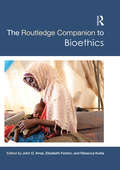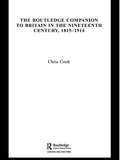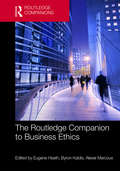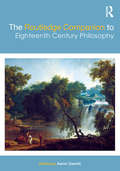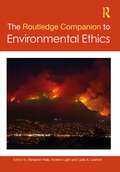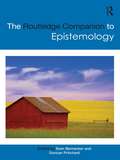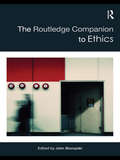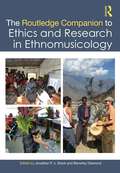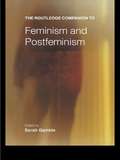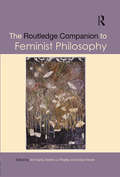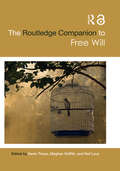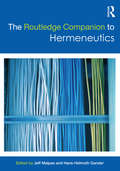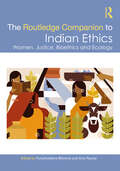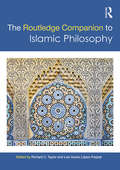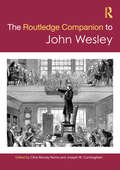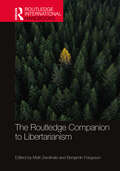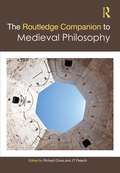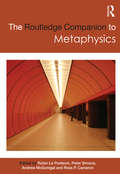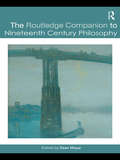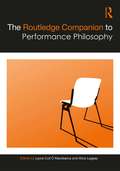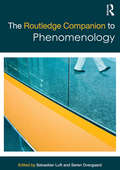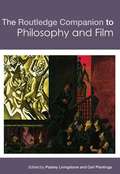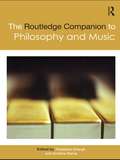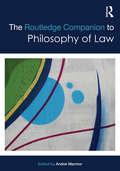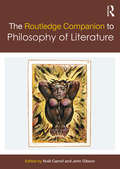- Table View
- List View
The Routledge Companion to Bioethics (Routledge Philosophy Companions)
by John D. Arras Elizabeth Fenton Rebecca KuklaThe Routledge Companion to Bioethics is a comprehensive reference guide to a wide range of contemporary concerns in bioethics. The volume orients the reader in a changing landscape shaped by globalization, health disparities, and rapidly advancing technologies. Bioethics has begun a turn toward a systematic concern with social justice, population health, and public policy. While also covering more traditional topics, this volume fully captures this recent shift and foreshadows the resulting developments in bioethics. It highlights emerging issues such as climate change, transgender, and medical tourism, and re-examines enduring topics, such as autonomy, end-of-life care, and resource allocation.
The Routledge Companion to Britain in the Nineteenth Century, 1815-1914 (Routledge Companions to History)
by Chris CookThe Routledge Companion to Britain in the Nineteenth Century, 1815–1914 is an accessible and indispensable compendium of essential information on the Victorian and Edwardian eras. Using chronologies, maps, glossaries, an extensive bibliography, a wealth of statistical information and nearly two hundred biographies of key figures, this clear and concise book provides a comprehensive guide to modern British history from the end of the Napoleonic Wars to the outbreak of the First World War. As well as the key areas of political, economic and social development of the era, this book also covers the increasingly emergent themes of sexuality, leisure, gender and the environment, exploring in detail the following aspects of the nineteenth century: parliamentary and political reform chartism, radicalism and popular protest the Irish Question the rise of Imperialism the regulation of sexuality and vice the development of organised sport and leisure the rise of consumer society. This book is an ideal reference resource for students and teachers alike.
The Routledge Companion to Business Ethics (Routledge Companions in Business, Management and Accounting)
by Byron Kaldis Eugene Heath Alexei MarcouxThe field of business ethics continues to expand intellectually and geographically. During the past five decades, scholars have developed and deepened their inquiries into the ethics of commercial and corporate conduct. This Companion provides a novel overview of the discipline of business ethics, covering the major areas of the field as well as new and emerging topics. The eight thematic units range over an extraordinary set of subjects and include chapters on the history and pedagogy of business ethics, moral philosophy, the nature of business, responsibilities within the firm, economic institutions, the 2008 financial crisis, globalization, and business ethics in different regions of the world. Led by a well-respected editorial team, this unique volume gathers an international array of experts whose various critical approaches yield insights from areas such as public policy, economics, law, and history, in addition to business and philosophy. With its fresh analyses, wide scope, and clarity of approach, this volume will be an essential addition to library collections in business, management, and applied ethics.
The Routledge Companion to Eighteenth Century Philosophy (Routledge Philosophy Companions)
by Aaron GarrettThe Eighteenth century is one of the most important periods in the history of Western philosophy, witnessing philosophical, scientific, and social and political change on a vast scale. In spite of this, there are few single volume overviews of the philosophy of the period as a whole. The Routledge Companion to Eighteenth Century Philosophy is an authoritative survey and assessment of this momentous period, covering major thinkers, topics and movements in Eighteenth century philosophy. Beginning with a substantial introduction by Aaron Garrett, the thirty-five specially commissioned chapters by an outstanding team of international contributors are organised into seven clear parts: Context and Movements Metaphysics and Understanding Mind, Soul, and Perception Morals and Aesthetics Politics and Society Philosophy in relation to the Arts and Sciences Major Figures. Major topics and themes are explored and discussed, ranging from materialism, free will and personal identity; to the emotions, the social contract, aesthetics, and the sciences, including mathematics and biology. The final section examines in more detail three figures central to the period: Hume, Rousseau and Kant. As such The Routledge Companion to Eighteenth Century Philosophy is essential reading for all students of the period, both in philosophy and related disciplines such as politics, literature, history and religious studies.
The Routledge Companion to Environmental Ethics (Routledge Philosophy Companions)
by Benjamin Hale Andrew Light Lydia A. LawhonWritten for a wide range of readers in environmental science, philosophy, and policy-oriented programs The Routledge Companion to Environmental Ethics is a landmark, comprehensive reference work in this interdisciplinary field. Not merely a review of theoretical approaches to the ethics of the environment, the Companion focuses on specific environmental problems and other concrete issues. Its 65 chapters, all appearing in print here for the first time, have been organized into the following eleven parts: I. AnimalsII. LandIII. WaterIV. ClimateV. Energy and ExtractionVI. CitiesVII. AgricultureVIII. Environmental TransformationIX. Policy Frameworks and Response MeasuresX. Regulatory ToolsXI. Advocacy and Activism The volume not only explains the nuances of important core philosophical positions, but also cuts new pathways for the integration of important ethical and policy issues into environmental philosophy. It will be of immense help to undergraduate students and other readers coming up to the field for the first time, but also serve as a valuable resource for more advanced students as well as researchers who need a trusted resource that also offers fresh, policy-centered approaches.
The Routledge Companion to Epistemology (Routledge Philosophy Companions)
by Duncan Pritchard Sven BerneckerEpistemology, the philosophy of knowledge, is at the core of many of the central debates and issues in philosophy, interrogating the notions of truth, objectivity, trust, belief and perception. The Routledge Companion to Epistemology provides a comprehensive and the up-to-date survey of epistemology, charting its history, providing a thorough account of its key thinkers and movements, and addressing enduring questions and contemporary research in the field. Organized thematically, the Companion is divided into ten sections: Foundational Issues, The Analysis of Knowledge, The Structure of Knowledge, Kinds of Knowledge, Skepticism, Responses to Skepticism, Knowledge and Knowledge Attributions, Formal Epistemology, The History of Epistemology, and Metaepistemological Issues. Seventy-eight chapters, each between 5000 and 7000 words and written by the world’s leading epistemologists, provide students with an outstanding and accessible guide to the field. Designed to fit the most comprehensive syllabus in the discipline, this text will be an indispensible resource for anyone interested in this central area of philosophy. The Routledge Companion to Epistemology is essential reading for students of philosophy.
The Routledge Companion to Ethics (Routledge Philosophy Companions)
by John SkorupskiThe Routledge Companion to Ethics is an outstanding survey of the whole field of ethics by a distinguished international team of contributors. Over 60 chapters are divided into six clear sections: the history of ethics meta-ethics perspectives from outside ethics ethical perspectives morality debates in ethics. The Companion opens with a comprehensive historical overview of ethics, including chapters on Plato, Aristotle, Hume, and Kant, and ethical thinking in China, India and the Arabic tradition. The second part covers the domain of meta-ethics. The third part covers important challenges to ethics from the fields of anthropology, psychology, sociobiology and economics. The fourth and fifth sections cover competing theories of ethics and the nature of morality respectively, with entries on consequentialism, Kantian morality, virtue ethics, relativism, evil, and responsibility amongst many others. A comprehensive final section includes the most important topics and controversies in applied ethics, such as rights, justice and distribution, the end of life, the environment, poverty, war and terrorism. The Routledge Companion to Ethics is a superb resource for anyone interested in the subject, whether in philosophy or related disciplines such as politics, education, or law. Fully indexed and cross-referenced, with helpful further reading sections at the end of each chapter, it is ideal for those coming to the field of ethics for the first time as well as readers already familiar with the subject.
The Routledge Companion to Ethics and Research in Ethnomusicology (Routledge Music Companions)
by Beverley Diamond Jonathan P. J. StockThe Routledge Companion to Ethics and Research in Ethnomusicology is an in-depth survey of the moral challenges and imperatives of conducting research on people making music. It focuses on fundamental and compelling ethical questions that have challenged and shaped both the history of this discipline and its current practices. In 26 representative cases from across a broad spectrum of geographical, societal, and musical environments, authors collectively reflect on the impacts of ethnomusicological research, exploring the ways our work may instantiate privilege or risk bringing harm, as well as the means that are available to provide recognition, benefit, and reciprocation to the musicians and others who contribute to our studies. In a world where differing ethical values are often in conflict, and where music itself is meanwhile a powerful tool in projecting moral claims, we aim to uncover the conditions and consequences of the ethical choices we face as ethnomusicologists, thereby contributing to building a more engaged, restructured discipline and a more globally responsible music studies. The volume comprises four parts: (1) sound practices and philosophies of ethics; (2) fieldwork encounters; (3) environment, trauma, collaboration; and (4) research in public domains.
The Routledge Companion to Feminism and Postfeminism (Routledge Companions)
by Sarah GambleApproachable for general readers as well as for students in women's studies related courses at all levels, this invaluable guide follows the unique Companion format in combining over a dozen in-depth background chapters with more than 400 A-Z dictionary entries. The background chapters are written by major figures in the field of feminist studies, and include thorough coverage of the history of feminism, as well as extensive discussions of topics such as Postfeminism, Men in Feminism, Feminism and New Technologies and Feminism and Philosophy. The dictionary entries cover the major individuals and issues essential to an understanding both of feminism's roots and of the trends that are shaping its future. Readers will find entries on people such as Aphra Behn, Simone de Beauvoir, Princess Diana, Courtney Love and Robert Bly, and on subjects such as Afro-American feminism, cosmetic surgery, the 'new man', prostitution, reproductive technologies and 'slasher' films.
The Routledge Companion to Feminist Philosophy (Routledge Philosophy Companions)
by Alison Stone Ann Garry Serene J. KhaderThe Routledge Companion to Feminist Philosophy is an outstanding guide and reference source to the key topics, subjects, thinkers, and debates in feminist philosophy. Fifty-six chapters, written by an international team of contributors specifically for the Companion, are organized into five sections: (1) Engaging the Past; (2) Mind, Body, and World; (3) Knowledge, Language, and Science; (4) Intersections; (5) Ethics, Politics, and Aesthetics. The volume provides a mutually enriching representation of the several philosophical traditions that contribute to feminist philosophy. It also foregrounds issues of global concern and scope; shows how feminist theory meshes with rich theoretical approaches that start from transgender identities, race and ethnicity, sexuality, disabilities, and other axes of identity and oppression; and highlights the interdisciplinarity of feminist philosophy and the ways that it both critiques and contributes to the whole range of subfields within philosophy.
The Routledge Companion to Free Will (Routledge Philosophy Companions)
by Neil Levy Meghan Griffith Kevin TimpeQuestions concerning free will are intertwined with issues in almost every area of philosophy, from metaphysics to philosophy of mind to moral philosophy, and are also informed by work in different areas of science (principally physics, neuroscience and social psychology). Free will is also a perennial concern of serious thinkers in theology and in non-western traditions. Because free will can be approached from so many different perspectives and has implications for so many debates, a comprehensive survey needs to encompass an enormous range of approaches. This book is the first to draw together leading experts on every aspect of free will, from those who are central to the current philosophical debates, to non-western perspectives, to scientific contributions and to those who know the rich history of the subject. Its 61 chapters, commissioned especially for this volume from the world’s leading researchers, are framed by a General Introduction and briefer introductions for each of the six sections. A list of References, an annotated Suggested Reading list, and a short list of Related Topics are included at the end of each chapter.
The Routledge Companion to Hermeneutics (Routledge Philosophy Companions)
by Jeff Malpas and Hans-Helmuth GanderHermeneutics is a major theoretical and practical form of intellectual enquiry, central not only to philosophy but many other disciplines in the humanities and social sciences. With phenomenology and existentialism, it is also one of the twentieth century’s most important philosophical movements and includes major thinkers such as Heidegger, Gadamer and Ricoeur. The Routledge Companion to Hermeneutics is an outstanding guide and reference source to the key philosophers, topics and themes in this exciting subject and is the first volume of its kind. Comprising over fifty chapters by a team of international contributors the Companion is divided into five parts: main figures in the hermeneutical tradition movement, including Heidegger, Gadamer and Ricoeur main topics in hermeneutics such as language, truth, relativism and history the engagement of hermeneutics with central disciplines such as literature, religion, race and gender, and art hermeneutics and world philosophies including Asian, Islamic and Judaic thought hermeneutic challenges and debates, such as critical theory, structuralism and phenomenology.
The Routledge Companion to Indian Ethics: Women, Justice, Bioethics and Ecology
by Purushottama Bilimoria Amy RaynerThis companion volume focuses on the application and practical ramifications of Indian ethics. Here Indian dharma ethics is moved from its preeminent religious origins and classical metaethical proclivity to, what Kant would call, practical reason – or in Aristotle’s poignant terms, ēhikos and phronēis –and in more modern parlance normative ethics. Our study examines a wide range of social and normative challenges facing people in such diverse areas as women’s rights, infant ethics, politics, law, justice, bioethics and ecology. As a contemporary volume, it builds linkages between existing theories and emerging moral issues, problems and questions in today’s India in the global arena. The volume brings together contributions from some 40 philosophers and contemporary thinkers on practical ethics, exploring both the scope and boundaries or limits of ethics as applied to everyday and real-life concerns and socio-economic challenges facing India in the context of a troubled globalizing world. As such, this collection draws on multiple forms of writing and research, including narrative ethics, interviews, critical case studies and textual analyses.The book will be of interest to scholars, researchers and students of Indian philosophy, Indian ethics, women and infant issues, social justice, environmental ethics, bioethics, animal ethics and cross-cultural responses to dominant Western moral thought. It will also be useful to researchers working on the intersection of Gandhi, sustainability, ecology, theology, feminism, comparative philosophy and dharma studies.
The Routledge Companion to Islamic Philosophy (Routledge Philosophy Companions)
by Richard C. Taylor Luis Xavier López-FarjeatThis valuable reference work synthesizes and elucidates traditional themes and issues in Islamic philosophy as well as prominent topics emerging from the last twenty years of scholarship. Written for a wide readership of students and scholars, The Routledge Companion to Islamic Philosophy is unique in including coverage of both perennial philosophical issues in an Islamic context and also distinct concerns that emerge from Islamic religious thought. This work constitutes a substantial affirmation that Islamic philosophy is an integral part of the Western philosophical tradition. Featuring 33 chapters, divided into seven thematic sections, this volume explores the major areas of philosophy: Logic, Metaphysics, Philosophy in the Sciences, Philosophy of Mind/Epistemology, and Ethics/Politics as well as philosophical issues salient in Islamic revelation, theology, prophecy, and mysticism. Other features include: •A focus on both the classical and post-classical periods •A contributing body that includes both widely respected scholars from around the world and a handful of the very best younger scholars •"Reference" and "Further Reading" sections for each chapter and a comprehensive index for the whole volume The result is a work that captures Islamic philosophy as philosophy. In this way it serves students and scholars of philosophy and religious studies and at the same time provides valuable essays relevant to the study of Islamic thought and theology.
The Routledge Companion to John Wesley (Routledge Religion Companions)
by Joseph W. Cunningham Clive Murray NorrisThe Routledge Companion to John Wesley provides an overview of the work and ideas of one of the principal founders of Methodism, John Wesley (1703-91). Wesley remains highly influential, especially within the worldwide Methodist movement of some eighty million people. As a preacher and religious reformer his efforts led to the rise of a global Protestant movement, but the wide-ranging topics addressed in his writings also suggest a mind steeped in the intellectual developments of the North Atlantic, early modern world. His numerous publications cover not only theology but ethics, history, aesthetics, politics, human rights, health and wellbeing, cosmology and ecology. This volume places Wesley within his eighteenth-century context, analyzes his contribution to thought across his multiple interests, and assesses his continuing relevance today. It contains essays by an international team of scholars, drawn from within the Methodist tradition and beyond. This is a valuable reference particularly for scholars of Methodist Studies, theology, church history and religious history.
The Routledge Companion to Libertarianism (Routledge International Handbooks)
by Matt ZwolinskiHave you ever wondered what libertarians think about vaccine mandates? About gun control? About racial and sexual inequalities? While libertarianism is well known as a political theory relating to the scope and justification of state authority, the breadth and depth of libertarian work on a wide range of other topics in social and political philosophy is less well known. This handbook is the first definitive reference on libertarianism that offers an in-depth survey of the central ideas from across philosophy, politics, and economics, including applications to contemporary policy issues. The forty chapters in this work provide an encyclopedic overview of libertarian scholarship, from foundational debates about natural rights theories vs. utilitarian approaches, to policy debates over immigration, punishment and policing, and intellectual property. Each chapter presents a comprehensive and up-to-date overview of historical and contemporary libertarian thought on its subject, and thus serves as an essential guide to current scholarship, and a starting place for discovering future lines of research. The book also contains a section on criticisms of libertarianism, written by leading scholars from the feminist, republican, socialist, and conservative perspectives, as well as a section on how libertarian political theory relates to various schools of economic thought, such as the Chicago, Austrian, Bloomington, and Public Choice schools. This book is an essential and comprehensive guide for anyone interested in libertarianism, whether sympathizer or critic.
The Routledge Companion to Medieval Philosophy (Routledge Philosophy Companions)
by Richard Cross Jt PaaschLike any other group of philosophers, scholastic thinkers from the Middle Ages disagreed about even the most fundamental of concepts. With their characteristic style of rigorous semantic and logical analysis, they produced a wide variety of diverse theories about a huge number of topics.The Routledge Companion to Medieval Philosophy offers readers an outstanding survey of many of these diverse theories, on a wide array of subjects. Its 35 chapters, all written exclusively for this Companion by leading international scholars, are organized into seven parts: I Language and LogicII MetaphysicsIII Cosmology and Physics IV Psychology V Cognition VI Ethics and Moral Philosophy VII Political Philosophy In addition to shedding new light on the most well-known philosophical debates and problems of the medieval era, the Companion brings to the fore topics that may not traditionally be associated with scholastic philosophy, but were in fact a veritable part of the tradition. These include chapters covering scholastic theories about propositions, atomism, consciousness, and democracy and representation. The Routledge Companion to Medieval Philosophy is a helpful, comprehensive introduction to the field for undergraduate students and other newcomers as well as a unique and valuable resource for researchers in all areas of philosophy.
The Routledge Companion to Metaphysics (Routledge Philosophy Companions)
by Peter Simons Robin Le Poidevin Andrew McGonigal Ross P. CameronThe Routledge Companion to Metaphysics is an outstanding, comprehensive and accessible guide to the major themes, thinkers, and issues in metaphysics. The Companion features over fifty specially commissioned chapters from international scholars which are organized into three clear parts: History of Metaphysics Ontology Metaphysics and Science. Each section features an introduction which places the range of essays in context, while an extensive glossary allows easy reference to key terms and definitions. The Routledge Companion to Metaphysics is essential reading for students of philosophy and anyone interested in surveying the central topics and problems in metaphysics from causation to vagueness and from Plato and Aristotle to the present-day.
The Routledge Companion to Nineteenth Century Philosophy (Routledge Philosophy Companions)
by Dean MoyarThe nineteenth century is a period of stunning philosophical originality, characterised by radical engagement with the emerging human sciences. Often overshadowed by twentieth century philosophy which sought to reject some of its central tenets, the philosophers of the nineteenth century have re-emerged as profoundly important figures. The Routledge Companion to Nineteenth Century Philosophy is an outstanding survey and assessment of the century as a whole. Divided into seven parts and including thirty chapters written by leading international scholars, the Companion examines and assesses the central topics, themes, and philosophers of the nineteenth century, presenting the first comprehensive picture of the period in a single volume: German Idealism philosophy as political action, including young Hegelians, Marx and Tocqueville philosophy and subjectivity, including Schopenhauer, Kierkegaard and Nietzsche scientific naturalism, including Darwinism, philosophy of race, experimental psychology and Neo-Kantianism utilitarianism and British Idealism American Idealism and Pragmatism new directions in Mind and Logic, including Brentano, Frege and Husserl. The Routledge Companion to Nineteenth Century Philosophy is essential reading for students of philosophy, and for anyone interested in this period in related disciplines such as politics, history, literature and religion.
The Routledge Companion to Performance Philosophy (Routledge Companions)
by Laura Cull Ó MaoilearcaThe Routledge Companion to Performance Philosophy is a volume of especially commissioned critical essays, conversations, collaborative, creative and performative writing mapping the key contexts, debates, methods, discourses and practices in this developing field. Firstly, the collection offers new insights on the fundamental question of how thinking happens: where, when, how and by whom philosophy is performed. Secondly, it provides a plurality of new accounts of performance and performativity – as the production of ideas, bodies and knowledges – in the arts and beyond. Comprising texts written by international artists, philosophers and scholars from multiple disciplines, the essays engage with questions of how performance thinks and how thought is performed in a wide range of philosophies and performances, from the ancient to the contemporary. Concepts and practices from diverse geographical regions and cultural traditions are analysed to draw conclusions about how performance operates across art, philosophy and everyday life. The collection both contributes to and critiques the philosophy of music, dance, theatre and performance, exploring the idea of a philosophy from the arts. It is crucial reading material for those interested in the hierarchy of the relationship between philosophy and the arts, advancing debates on philosophical method, and the relation between Performance and Philosophy more broadly.
The Routledge Companion to Phenomenology (Routledge Philosophy Companions)
by Søren Overgaard Sebastian LuftPhenomenology was one of the twentieth century’s major philosophical movements and continues to be a vibrant and widely studied subject today. The Routledge Companion to Phenomenology is an outstanding guide and reference source to the key philosophers, topics and themes in this exciting subject, and essential reading for any student or scholar of phenomenology. Comprising over fifty chapters by a team of international contributors, the Companion is divided into five clear parts: main figures in the phenomenological movement, from Brentano to Derrida main topics in phenomenology phenomenological contributions to philosophy phenomenological intersections historical postscript. Close attention is paid to the core topics in phenomenology such as intentionality, perception, subjectivity, the self, the body, being and phenomenological method. An important feature of the Companion is its examination of how phenomenology has contributed to central disciplines in philosophy such as metaphysics, philosophy of mind, moral philosophy, aesthetics and philosophy of religion as well as disciplines beyond philosophy such as race, cognitive science, psychiatry, literary criticism and psychoanalysis.
The Routledge Companion to Philosophy and Film (Routledge Philosophy Companions)
by Carl Plantinga Paisley LivingstonThe Routledge Companion to Philosophy and Film is the first comprehensive volume to explore the main themes, topics, thinkers and issues in philosophy and film. The Companion features sixty specially commissioned chapters from international scholars and is divided into four clear parts: • issues and concepts • authors and trends • genres • film as philosophy. Part one is a comprehensive section examining key concepts, including chapters on acting, censorship, character, depiction, ethics, genre, interpretation, narrative, reception and spectatorship and style. Part two covers authors and scholars of film and significant theories Part three examines genres such as documentary, experimental cinema, horror, comedy and tragedy. Part four includes chapters on key directors such as Tarkovsky, Bergman and Terrence Malick and on particular films including Memento. Each chapter includes a section of annotated further reading and is cross-referenced to related entries. The Routledge Companion to Philosophy and Film is essential reading for anyone interested in philosophy of film, aesthetics and film and cinema studies.
The Routledge Companion to Philosophy and Music (Routledge Philosophy Companions)
by Theodore Gracyk Andrew KaniaThe Routledge Companion to Philosophy and Music is an outstanding guide and reference source to the key topics, subjects, thinkers and debates in philosophy and music. Over fifty entries by an international team of contributors are organised into six clear sections: general issues emotion history figures kinds of music music, philosophy and related disciplines The Routledge Companion to Philosophy and Music is essential reading for anyone interested in philosophy, music and musicology.
The Routledge Companion to Philosophy of Law (Routledge Philosophy Companions)
by Andrei MarmorThe Routledge Companion to the Philosophy of Law provides a comprehensive, non-technical philosophical treatment of the fundamental questions about the nature of law. Its coverage includes law’s relation to morality and the moral obligations to obey the law, the main philosophical debates about particular legal areas such as criminal responsibility, property, contracts, family law, law and justice in the international domain, legal paternalism and the rule of law. The entirely new content has been written specifically for newcomers to the field, making the volume particularly useful for undergraduate and graduate courses in philosophy of law and related areas. All 39 chapters, written by the world’s leading researchers and edited by an internationally distinguished scholar, bring a focused, philosophical perspective to their subjects. The Routledge Companion to the Philosophy of Law promises to be a valuable and much consulted student resource for many years.
The Routledge Companion to Philosophy of Literature (Routledge Philosophy Companions)
by John Gibson Noël CarrollThe Routledge Companion to Philosophy of Literature is an in-depth examination of literature through a philosophical lens, written by distinguished figures across the major divisions of philosophy. Its 40 newly-commissioned essays are divided into six sections: historical foundations what is literature? aesthetics & appreciation meaning & interpretation metaphysics & epistemology ethics & political theory The Companion opens with a comprehensive historical overview of the philosophy of literature, including chapters on the study’s ancient origins up to the 18th-20th centuries. The second part defines literature and its different categories. The third part covers the aesthetics of literature. The fourth and fifth sections discuss the meaning and consequences of philosophical interpretation of literature, as well as epistemological and metaphysical issues such as literary cognitivism and imaginative resistance. The sixth section contextualizes the place of philosophy of literature in the "real world" with essays on topics such as morality, politics, race and gender. Fully indexed, with helpful further reading sections at the end of each chapter, this Companion is an ideal starting point for those coming to philosophy of literature for the first time as well as a valuable reference for readers more familiar with the subject.
